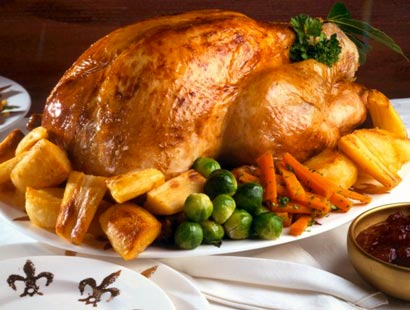Less than 1 hour to go, I fear that there is not enough
time… the turkeys/chicken/pigs/sprouts are already dead and in your fridge…MURDERERS! (lol jk!)
So… whilst you tuck in to your no doubt incredible spread
for Christmas dinner/lunch (or even breakfast-weirdoes!) and maybe saying
grace, spare a thought about the meat you’ll be eating - not about the most
probably sad lives they had running, well squeezed walking, cooped up
in a large industrial scale production house – but the emissions they produced and the smell *coughs*.
I could give you a lecture on ethics of meat production
but that would be so hypocritical I should be arrested (although there is an
interesting resource of literature and media on this very subject I would
strongly advise you to read and look at like this site!)… so instead let’s talk
about Christmas dinner! From the material highlighted in the videos shown and
the post earlier; all livestock, like any animal produces emissions directly
and indirectly. Christmas comes but once a year; unfortunately for us, but
fortunately for the environment and those lovely, tasty succulent…*drools*… om
nom nom… err…those birds.
Poultry (chickens/geese/ducks/turkeys) accounted for 61
million tonnes of CO2 in the year 2002, and numbered around 17
billion (a head) globally (LLS, FAO 2006)…weird thinking they’ve all almost
certainly have been eaten. That number astonishes me! And that was nearly 10
years ago! Our love of poultry is incredible, 29.06 kg/capita/year is consumed
in the UK alone for the year 2007 (great stat website! http://faostat.fao.org/). That’s a load of
emissions; not to mention the fertiliser gone into producing feed (such as
corn) for the poultry.
Once a year is acceptable, but maybe we should begin to
scrutinise our lifestyles. Poultry is by no means the worst offender; on the
contrary it is more emission efficient than ruminants like cows (where’s the
beef?). Like most things in life, the case of moderation persists.
This website also shows some meat consumption data in map
form (I love maps I do!), and there is always the great worldmapper site!
Livestock production, as I hope to have shown throughout
this blog touches upon a wide variety of topics; whilst on the subject of
phosphorous, the next posts will be on resources, depletion and pollution… more still to come!


I agree, the last video you posted is very insightful, reminding us of the priorities. I like the idea of using pee for P and hope it materilizes, as this will provide us with a renewable source of P, alleviating one of the numerous global problems. However, your last three posts also made me realize something more gloomy, which is that in reality people choose to lead an unsustainable lifestyle, such as choosing to consume meat, and shift the blame for problems such as the global food shortages onto factors like biofuels, for example, which is what I am writing about in my blog.
ReplyDeleteIt takes 3-4 times more P to support a meat-based diet and also more land to cultivate meat, as land is needed to produce cattle feed too. This means that meat production uses more natural resources, indirectly resulting in the food shortages. If we evaluated what our priorities are and all took responsibility for our own actions, would it not make more sense to lead a less meat-intensive diet, as this would free up the natural resources, such as land and P?
I find this issue very relevant to biofuels, as decreasing our meat consumption and food waste would likely result in less food shortages and free up more land for activities such as sustainable biofuel cultivation, which should result in GHG emissions savings and greater energy security. Would this not be more useful than leaving all as it is at present i.e. blaming so much on biofuels, for example, as the Gallagher Report (2008) seems to do, preventing the cultivation of biofuels, carrying on with our meat-intensive diet and high P consumption to then realize in the future that food shortages are still increasing as more and more people consume more, P and fossil fuels are running out and we are not prepared for that, and our GHG emissions have not decreased.
While I am also a hypocrite promoting a vegetarian diet here, my point is that I feel that too much emphasis is placed onto blaming industrial activities for the global problems and very little onto us, the consumers, which is not always useful. Therefore I very much agree with you that we should take greater action as citizens (I think this is what you were trying to say, if I understood correctly), even though technological fixes may help.
Sorry for such a long post, but your posts have made me think a lot!